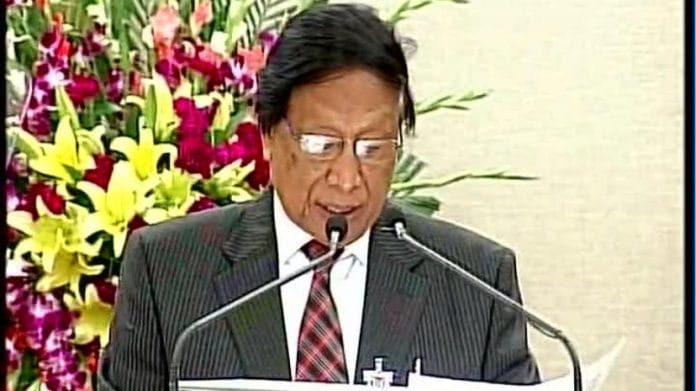Guwahati: With no hope of progress in talks between the National Socialist Council of Nagaland (Isak-Muivah) and the Centre, the outfit has released a letter written by its Ato Kilonser or general secretary Thuingaleng Muivah to Prime Minister Narendra Modi on 25 February.
The eight-page letter was made public Monday evening, to “inform the Naga people of the delay and the lack of response from the office of the Prime Minister”, the NSCN (I-M) stated.
The latest talks held in New Delhi amid the Covid-19 pandemic have been inconclusive, with both the Centre and the NSCN (I-M) sticking to their respective stands, and the outfit remaining steadfast in its demand for a separate Naga national flag and constitution.
Also read: Naga peace moves gain pace with new round of talks, but differences make a deadline elusive
Talks in a ‘third country’
The 85-year-old Muivah had written to PM Modi to facilitate talks “outside India in a third country”, and was also critical of the functioning of the Ministry of Home Affairs (MHA).
Muivah also complained about the activities of the National Investigation Agency (NIA) and the paramilitary force Assam Rifles, and expressed shock that “even after more than two decades of political negotiation, the MHA and its agencies have become obnoxious”.
The letter made clear that “in the given circumstances and in order to save the political dialogue, the talks should resume at the highest, i.e Prime Minister level, without pre-condition, and outside India in a third country”.
“And if our stay in India is no more welcome, all necessary arrangements must be made for us to leave India and the political talks be resumed in a third country,” Muivah further said.
Muivah’s letter to the prime minister listed how several rounds of talks under different prime ministers were held in various countries, including France, the US, the Netherlands, Bangkok, Thailand and others, before being held in New Delhi and Dimapur.
Role of interlocutor Ravi
The letter also discussed the role of interlocutor R.N. Ravi, accusing him of “polarising the Naga society instead of uniting the Nagas”. Muivah stated that Ravi’s appointment as the Nagaland governor in 2019 was a “deliberate deviation from his appointment as the representative of the government of India for the peace talks”.
“It has come to our knowledge that the representative of the (government of India) has been hobnobbing with the so-called NNPGs (Naga national political groups) to make an agreement”, while leaving out “the main stakeholders including the Naga Hoho, Naga Mothers, Naga People’s Movement for Human Rights and Naga Students’ Federation”, Muivah said.
“We need not remind the GoI that such action of the representative of the GoI will certainly be another Himalayan blunder while dealing with the Indo-Naga issue,” he added.
Attempts to shift from the battleground of insurgency to the negotiating table has been a long-drawn process of over 22 years, but Muivah stated that “if India or the BJP-led NDA government is not prepared and ready to let the Nagas have their share of an honourable and acceptable solution, then, let the Lord God Almighty judge between India and Nagas”.
Sunday, all churches and prayer groups in Nagaland observed a day of fasting and conducted a “Prayer of Agreement” for a “solution of the Indo-Naga political issue at the earliest”. The Council of Nagalim Churches (CNC), a body under the NSCN-IM, had appealed to Naga Christians to observe fast and offer prayers.
Also read: Naga leaders can be convinced to agree with Centre, says ex-chief of peace keeping body
Long peace process
The NSCN (I-M) has held more than 100 rounds of peace talks with the Centre within and outside the country.
It was in 1975 that the Centre signed the Shillong Agreement with a moderate faction of the political organisation Naga National Council (NNC), that had been formed in 1946. After a short spell of peace for two years, the dissident group led by Muivah, Isak Chisi Swu and Shangnyu Shangwang Khaplang rejected the pact outright, and went underground again, spending much of their time in Myanmar. They formed the NSCN in January 1980, and eight years later, it split into the NSCN (I-M) and the NSCN (K) in April 1988 over differences in initiating a dialogue process with the Indian government.
The NSCN (I-M) has been unofficially in talks with the government since 1994, while the formal talks with the Centre began only in 1997 when a ceasefire agreement was signed. In August 2015, the government signed a Framework Agreement to seek a final solution with the NSCN (I-M). The NSCN (K) violated the ceasefire in 2015, but three breakaway factions formed a new group and entered the dialogue later.
The Centre officially extended the scope of talks with NNPGs by signing a ‘Deed of Commitment’ two years later. The NNPGs are seven Naga insurgent groups that are also holding talks with the central government, but separately.
Also read: Modi govt could look beyond NSCN (I-M) for peace in Nagaland as new players emerge







I don’t think government can have peace rather it seems to divide india into pieces